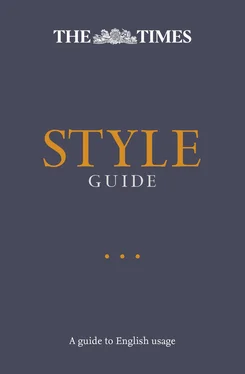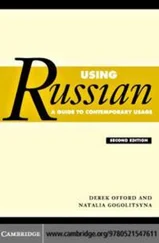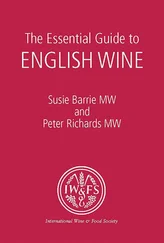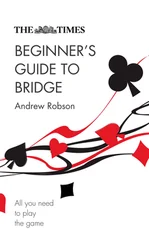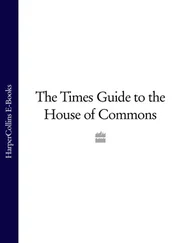In Spanish give accents only on the names of people, if they can be checked. In other Spanish words and place names, ignore accents and diacritical marks except for n with the tilde ( Ñ or ñ , as in El Niño); this is considered a distinct letter of the alphabet in its own right and is also familiar to (and easily pronounceable by) most English-speaking readers
Achilles’ heela small but deadly area of weakness in someone seemingly invulnerable (like the Greek hero of the Trojan war, hence cap and apostrophe); but achilles tendon (lower case, no apostrophe, as the connection with the myth is more remote)
acknowledgmentas with most (but not quite all) such words, no middle e
acronyma word formed from the initial letters or groups of letters of words in a set phrase or series of words, eg Opec , from the Organisation of Petroleum Exporting Countries, or Ukip for the United Kingdom Independence Party. If the acronym is easily pronounced and usually spoken as a word, write with an initial cap and then lower case: Opec, Nato, Ukip, Rada, Bafta, Nice, Acas, Asbo etc; follow this house style whatever the organisation itself may choose to do. Acronyms do not normally take the definite article.
Non-acronym abbreviations based on initials that are spelt out separately in speech (ie not pronounced as a word) remain in caps, and normally retain a definite article: the BBC, the RAF, the CBI, the LSO, the UN, the EU etc. A few, by convention, take an unpleasant mixture of upper and lower case: MoT, the MoD, the DfE, the IoD . All but the most familiar organisations, bodies, concepts and things should be named in full at first mention with the initials in brackets. However, a lot of initials in text will produce an unappetising alphabet soup, so use as sparingly as possible; after first mention try to vary with a suitable word: the ministry, the corporation, the department, the institute etc
Acttheatre, ballet, opera etc, use cap and use roman numerals when naming, specifying or giving references: Macbeth , Act I, Act II etc; for more general refs use lower case, eg “in the second act of the play”, “in the third scene of Act II”
Actand Bill (parliamentary) cap when giving full name (the Data Protection Act, the Assisted Dying for the Terminally Ill Bill etc) but otherwise lower case: “a bill intended to decriminalise assisted suicide”; “the act covers the gathering, storing and processing of personal information” etc
actionas a transitive verb meaning undertake (“The marketing department will action this”) is corporate jargon of the most irritating kind; avoid
active verbsgenerally better (and shorter) than passive
actor, actressfor women use the feminine designation
AD, BCnote that AD comes before the date, eg AD35; BC comes after, 350BC. Both have no spaces. With century, both are used after, eg 3rd century BC/AD. The terms BCE and CE (Common Era) are not to be used by Times writers but may exceptionally be allowed to a guest columnist/letter writer if context/courtesy seems to demand it (eg Lord Sacks, as chief rabbi, preferred CE in his Credo columns)
addressesno commas in 1 Pennington Street, 3 Thomas More Square, 1 London Bridge Street etc; and do not abbreviate. No commas either between county names and postcodes, eg West Sussex BN6 9GS
adjectivesdo not overuse, especially in news reporting. Ask if the adjective is necessary and what it adds. Try to use adjectives to add precision, not merely for colour or emphasis. Beware especially those adjectives that come unbidden to mind with particular nouns: serious danger, devout Catholic, staunch Protestant, blithering idiot
administration(US) now lower case (cf government) even when specific, eg the Trump administration; generic always lower case, eg a lame-duck administration; also lower case adjectival, eg an administration official
Admiraldo not abbreviate to Adm Jones etc except in lists; upper case when used as a title (Admiral Jones), at subsequent mentions “the admiral”
ad nauseamnot ad nauseum
adrenalinewith the final e
advance noticeis faintly tautologous, but probably defensible; “advanced notice” is just wrong
adverbsas with adjectives (only more so), do not overuse, and never use without thought. Ask what, if anything, is being added or changed. Consider if there might be a better way of achieving the same effect, eg by using a more vivid or dramatic verb: to rush or race, say, rather than to run fast.
Adverbs are rarely a good way of beginning a sentence. “Interestingly”, “ironically”, “oddly” all clumsily flag something that ought to become obvious to the reader soon enough.
When adverbs are used to qualify adjectives the joining hyphen is rarely needed, eg heavily pregnant, classically carved, colourfully decorated. In some cases, however, such as “well founded”, “ill educated”, when used before the noun, eg a well-founded rumour, write the compound with the hyphen. The best guidance is to use the hyphen in these phrases as little as possible or when the phrase would otherwise be ambiguous. Thus, “the island is well regulated”, but “it is a well-regulated island”
advertisementprefer to advert or ad, especially at first mention; but the shorter forms are perfectly acceptable (and often preferable at second mention and in headings etc)
advisernever advisor
-aemianot -emia, for blood conditions such as anaemia, leukaemia ; thus anaemic, leukaemic
affect, effectas a verb, to affect means to produce an effect on, to touch the feelings of, or to pretend to have or feel (as in affectation); to effect is to bring about, to accomplish. If in doubt, always consult the dictionary. Affect as a noun should be used only by psychologists, among themselves
affidavita written declaration on oath. Such phrases as “sworn affidavit” and “he swore an affidavit” are, strictly speaking, tautologous
Afghannoun or adjective; an afghani (lower case) is a unit of currency, not a person
Africanote north Africa, east Africa, west Africa, southern Africa, all lower case: these are locators, not place names (unlike South Africa)
African-Americanhyphenate
Afrikaansthe language; Afrikaners the people. Afrikanders a breed of cattle
afteralmost invariably to be used rather than “following” and always preferable to such ponderous constructions as “in the wake of”. Remember that after is a useful way of indicating a clear and particular temporal relationship; do not say after if what you mean is when. Also beware of lazily using after to convey a cause relationship. “The British player won a place in the final after beating the seeded German” is journalese for “… by beating the seeded German”
afterlifeone word
ageingtakes the middle e
agesare helpful to readers; they add context and human interest, particularly in stories involving unfamiliar people. Use common sense. Information should be useful or interesting, not distracting; there is no need to give an age for every minor figure mentioned in passing in a news report, or to tell Times readers how old the prime minister is whenever she crops up.
Читать дальше
